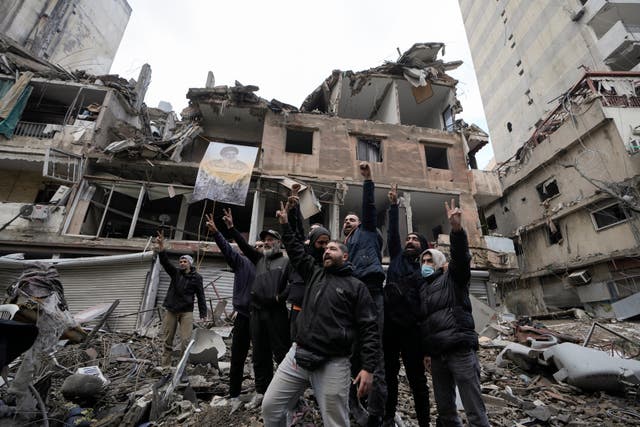
A ceasefire between Israel and the Lebanese militant group Hezbollah appears to be holding.
Residents in cars heaped with belongings are streaming back towards southern Lebanon, despite warnings from the Israeli and Lebanese militaries that they should stay away from certain areas.
If it holds, the ceasefire would bring an end to nearly 14 months of fighting between Israel and Hezbollah, which escalated in mid-September into all-out war and threatened to pull Hezbollah’s patron Iran and Israel into a broader regional conflagration. The deal does not address the war in Gaza.
It could offer a reprieve to the 1.2 million Lebanese displaced by the fighting and the tens of thousands of Israelis who fled their homes along the border with Lebanon.
The US- and France-brokered deal, approved by Israel late on Tuesday, calls for an initial two-month halt to fighting and requires Hezbollah to end its armed presence in southern Lebanon, while Israeli troops are to return to their side of the border.
Today, I have good news to report from the Middle East.
I have spoken to the Prime Ministers of Lebanon and Israel. And I am pleased to announce:
They have accepted the United States’ proposal to end the devastating conflict between Israel and Hezbollah.
— President Biden (@POTUS) November 26, 2024
Thousands of additional Lebanese troops and UN peacekeepers would deploy in the south, and an international panel headed by the United States would monitor compliance.
Israel says it reserves the right to strike Hezbollah should it violate the terms of the deal. Israeli forces are still fighting Hamas militants in Gaza in response to the group’s cross-border raid into southern Israel in October 2023.
However, US President Joe Biden said his administration would make another push in the coming days to try to renew efforts for a deal in the war-ravaged Palestinian enclave.

Meanwhile, fighting in Gaza rages on. The Gaza Health Ministry said 33 bodies had been brought to hospitals over the past 24 hours, raising the death toll in the nearly 14-month-long war to 44,282.
The Health Ministry does not distinguish between civilians and combatants in its count but says more than half of the dead are women and children.
The Israeli military said it struck dozens of Hamas sites in hard-hit northern Gaza, including weapons storage facilities and military structures.
It said it had warned civilians to evacuate the area beforehand. For weeks, the military has battled a resurgence of Hamas in the area, which was an early target of Israel’s offensive.
The Israel-Hezbollah ceasefire has no direct bearing on the conflict in Gaza, where international mediators have struggled to secure a truce.


Why are you making commenting on The National only available to subscribers?
We know there are thousands of National readers who want to debate, argue and go back and forth in the comments section of our stories. We’ve got the most informed readers in Scotland, asking each other the big questions about the future of our country.
Unfortunately, though, these important debates are being spoiled by a vocal minority of trolls who aren’t really interested in the issues, try to derail the conversations, register under fake names, and post vile abuse.
So that’s why we’ve decided to make the ability to comment only available to our paying subscribers. That way, all the trolls who post abuse on our website will have to pay if they want to join the debate – and risk a permanent ban from the account that they subscribe with.
The conversation will go back to what it should be about – people who care passionately about the issues, but disagree constructively on what we should do about them. Let’s get that debate started!
Callum Baird, Editor of The National
Comments: Our rules
We want our comments to be a lively and valuable part of our community - a place where readers can debate and engage with the most important local issues. The ability to comment on our stories is a privilege, not a right, however, and that privilege may be withdrawn if it is abused or misused.
Please report any comments that break our rules.
Read the rules here